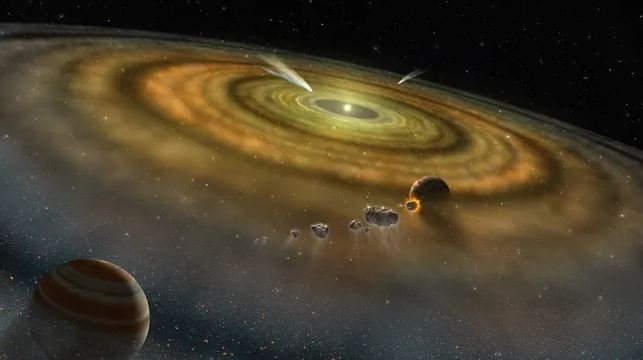A study recently published in the scientific journal Nature Astronomy suggests that: Earth’s water may have arisen from space rocks, the building blocks that make up the planet.
According to data, cosmic objects may have formed the Earth billions of years ago; After analyzing different meteorite samples, scientists found chemical reactions that only occur when water is present.
Researchers combined meteorite data with a form of thermodynamic modeling To determine whether the building blocks of the inner planets of the Solar System may have been formed by the presence of water from the beginning.
This discovery could be very important for science because it challenges existing astrophysics models that theorize about the origins of our star system. Researchers explain this The samples did not contain water, but they were able to trace chemical reactions that were only possible with primordial liquid.
Detection was only possible by measuring the iron level of meteorites compared to other ‘contents’ in space rocks. They detected the presence of oxygen as well as water.
“Iron meteorites have been somewhat neglected by the planet formation community, but they constitute rich repositories of information about the earliest period of Solar System history as we discover how to read the signals. Paul Asimow, one of the scientists responsible for the study, said that the difference between what we expected and what we measured in meteorites in the inner Solar System indicates approximately 10,000 times more oxygen activity.
Water in the World
new discovery may contradict current theory that water arose during the planet’s evolutionThis suggests that the element was already present in the building blocks of planets from the beginning.
For this reason, scientists participating in the study believe that water did not reach the Earth during the planet’s formation period; The history of other rocky planets in the Solar System may be similar.
Meteorite samples are the remains of the metallic cores of the first rocks of the Solar System’s building blocks; By analyzing the chemical composition of these cosmic objects, it is possible to discover fundamental information about the environments in which planets form. Even so, scientists need to dig deeper into the study to confirm the data.
“However, the method only detects water used in iron oxidation. It is not sensitive to excess water that could form the ocean. Therefore, the results of this study are consistent with Earth accumulation models that require late addition of more water-rich material,” explains Asimow.
Did you like the content? Therefore, always keep up to date with the latest studies on the formation of planet Earth at TecMundo and take the opportunity to learn why you should not use magnets to search for meteorites.
Source: Tec Mundo
I’m Blaine Morgan, an experienced journalist and writer with over 8 years of experience in the tech industry. My expertise lies in writing about technology news and trends, covering everything from cutting-edge gadgets to emerging software developments. I’ve written for several leading publications including Gadget Onus where I am an author.











